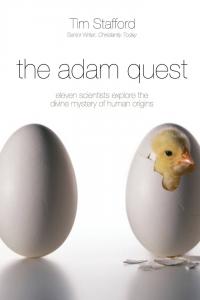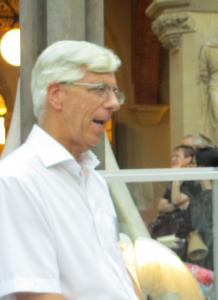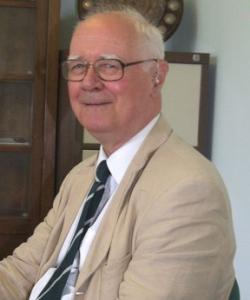 The final three scientists interviewed in Tim Stafford’s book The Adam Quest are British. Despite the conservative evangelical and fundamentalist stereotype of English Christianity as theologically bankrupt, there is an environment that allows sophisticated and serious Christian thinking to flourish. N.T. Wright, John Stott, and C.S. Lewis top the list for many of us. Beyond this we find Malcolm Jeeves, Alister McGrath, Tom McLeish (we will come back to his book Faith and Wisdom in Science soon), Mark Harris, and the final three in Stafford’s book, Denis Alexander, Simon Conway Morris and John Polkinghorne.
The final three scientists interviewed in Tim Stafford’s book The Adam Quest are British. Despite the conservative evangelical and fundamentalist stereotype of English Christianity as theologically bankrupt, there is an environment that allows sophisticated and serious Christian thinking to flourish. N.T. Wright, John Stott, and C.S. Lewis top the list for many of us. Beyond this we find Malcolm Jeeves, Alister McGrath, Tom McLeish (we will come back to his book Faith and Wisdom in Science soon), Mark Harris, and the final three in Stafford’s book, Denis Alexander, Simon Conway Morris and John Polkinghorne.
Denis Alexander’s story is fascinating. Born into a Christian home and family active in the Brethren, he felt a strong missionary call while taking a “gap” year in Canada before beginning his undergraduate work at Oxford. He studied biochemistry at Oxford eventually obtaining a Ph.D. in Biochemistry at the Institute of Psychiatry in London (a Christian professor convinced him that this wasn’t a waste of time). He took a teaching position in Turkey feeling a call to be a Christian witness in that officially secular country. Nine years in Turkey were followed by six years at the American University in Beirut Lebanon. Bullets and occasional artillery colored his experience in these countries.
 He returned to Great Britain with his wife and family after 15 years abroad. Although a non-traditional career track to be sure, he finally settled into a position at the Babraham Institute in Cambridge becoming chair of the Molecular Immunology Programme. Eventually he, along with “close Christian colleague Bob White, a professor of geophysics at Cambridge” and initial funding from the Templeton Foundation launched the Faraday Institute for Science and Religion in Cambridge. A multitude of resources are available online – including archived lectures on science and faith by a wide range of Christian speakers. He had a new mission field – to convey “the Christian message in an academically coherent manner.” (p. 164)
He returned to Great Britain with his wife and family after 15 years abroad. Although a non-traditional career track to be sure, he finally settled into a position at the Babraham Institute in Cambridge becoming chair of the Molecular Immunology Programme. Eventually he, along with “close Christian colleague Bob White, a professor of geophysics at Cambridge” and initial funding from the Templeton Foundation launched the Faraday Institute for Science and Religion in Cambridge. A multitude of resources are available online – including archived lectures on science and faith by a wide range of Christian speakers. He had a new mission field – to convey “the Christian message in an academically coherent manner.” (p. 164)
Our ambition is to change the culture of the discussion between science and religion in the academic world through good scholarship and good publications. We want to critique the presumption that the conflict thesis is the only story in town. … We want to educate people about the religious roots of science and explain what religion is claiming and what it is not claiming. We want to encourage an academically solid discourse that doesn’t have people shouting at each other.”
(p. 166)
Although Young Earth Creationism and Intelligent Design have less influence in Great Britain than in the USA, the questions at the intersection of science and faith are significant. Denis Alexander has published a number of books on science and faith including Creation or Evolution, Do We Have to Choose? and most recently Genes, Determinism and God – a book I hope to dig into soon.
 In contrast to Denis Alexander, Simon Conway Morris found found Christian faith in adulthood through reading C.S. Lewis and his friends Dorothy Sayers, J. R. R. Tolkien, Charles Williams, Owen Barfield, and from a generation earlier, G. K. Chesterton. “These writers led Conway Morris to Christ. … “They opened completely new worlds. They allow[ed] us to step outside of ourselves, ask what it means to be human, why we are not animals anymore while clearly of animal derivation.” ” (p. 175)
In contrast to Denis Alexander, Simon Conway Morris found found Christian faith in adulthood through reading C.S. Lewis and his friends Dorothy Sayers, J. R. R. Tolkien, Charles Williams, Owen Barfield, and from a generation earlier, G. K. Chesterton. “These writers led Conway Morris to Christ. … “They opened completely new worlds. They allow[ed] us to step outside of ourselves, ask what it means to be human, why we are not animals anymore while clearly of animal derivation.” ” (p. 175)
Simon Conway Morris is a paleontologist, a professor at the University of Cambridge, an expert in the Burgess Shale and the Cambrian explosion. Although this explosion has been pointed to as evidence for the contingent random purposelessness of evolution (Stephen Jay Gould in a variety of writings) or Intelligent Design (Stephen Meyer in Darwin’s Doubt) Conway Morris has a different take. Evolution is constrained by necessity and efficient solutions to practical problems are found multiple times. He works through this in his book Life’s Solution. “Conway Morris’s challenge spoke directly to a key metaphysical claim often made about evolution: that it is pointless and meaningless, utterly random and therefore strips life of transcendent meaning.” (p. 177) Evolutionary science doesn’t really speak to meaning and evolution “may be random in the details, but not in the outcome.” (p. 177) Meaningless materialism is not a scientific conclusion – and Conway Morris suggests that it may not even be the view most consistent with the natural world around us.
Near the end of the Boyle lecture, Conway Morris concluded that science, for all its value, comes in behind other ways of knowing truth: “Science when it treats creation as a true Creation, and thereby faces up to its responsibilities, may well be important. I expect [Robert] Boyle [founder of the lecture series] would have agreed. It seems ultimately, however, that it is the knowledge and experience of the Incarnation, the wisdom and warnings given by Jesus in the Gospels, and not least the Resurrection that in the final analysis are all that matters.” (p. 181)
 Stafford finishes his survey of Christians with John Polkinghorne. Another interesting story. The Rev. Dr. John Polkinghorne was born into a Christian home, regular attenders in the Anglican church. Although from a humble background, he was clearly talented in mathematics and provided with the opportunity to cultivate his ability. He studied mathematics at Trinity College in Cambridge, then pursued a Ph.D. in Physics – theoretical particle physics. He was very successful in his field. But it wasn’t enough. In his forties he left academic science (he was now a Professor at Cambridge) and went into the ministry becoming ordained in the Anglican Church. After a brief time in a rural parish he returned to Cambridge, first as dean of the chapel at Trinity Hall Cambridge and then as president of Queens. His views matured and developed during this time as did his sense of calling.
Stafford finishes his survey of Christians with John Polkinghorne. Another interesting story. The Rev. Dr. John Polkinghorne was born into a Christian home, regular attenders in the Anglican church. Although from a humble background, he was clearly talented in mathematics and provided with the opportunity to cultivate his ability. He studied mathematics at Trinity College in Cambridge, then pursued a Ph.D. in Physics – theoretical particle physics. He was very successful in his field. But it wasn’t enough. In his forties he left academic science (he was now a Professor at Cambridge) and went into the ministry becoming ordained in the Anglican Church. After a brief time in a rural parish he returned to Cambridge, first as dean of the chapel at Trinity Hall Cambridge and then as president of Queens. His views matured and developed during this time as did his sense of calling.
He had come to see his true vocation clearly. He was to be a hybrid, a “two-eyed” creature living in the university, who could see into and speak between realms that were hardly visible to each other, let alone on speaking terms – the realms of science and faith. (p. 190)
So much of science is what Polkinghorne calls “one-eyed.” It is focused on part of the world, not the whole world. Science is fascinating, and well worth studying, but there are many questions it cannot answer. But there is nothing unchristian about evolution. Understanding scientific truths can help us understand God. Stafford summarizes:
If evolution is the way in which God created the diversity of life, then Polkinghorne looks to see what evolution says about God himself. Evolution suggests a God working less like an engineer than a gardener. God’s creation is dynamic. It tends, over vast stretches of time, to extend into ever-greater articulation, variety, and beauty. Does this vision of God diminish his power and majesty? Not according to Polkinghorne. (p. 196)
Polkinghorne also advises caution. He “knows that scientists are apt to get carried away with the overarching significance of their discoveries – to overinflate their universality.” (p. 196) This doesn’t mean that science is untrustworthy, but it can be wise to take grand pronouncements with a grain of salt. Current evolutionary explanations of phenomena such as consciousness and art – creative imagination, hardly seem adequate.
Evolution isn’t a threat to the faith of any of these scientists. It is simply a mechanism within God’s creation, used for his purposes. All three take their faith quite seriously. Both John Polkinghorne and Denis Alexander have allowed their faith to shape their careers in ways that raise eyebrows in the scientific establishment. Simon Conway Morris has also stepped out in some of his more recent work, especially his book Life’s Solution.
Francis Collins isn’t included in Stafford’s book – the nature of his position as Director of the National Institutes of Health prevents him from contributing to such projects these days – but his book The Language of God tells a story quite similar to the profiles of Schweitzer, Falk, Louis, Alexander, Conway Morris, and Polkinghorne. A robust faith and a conviction that science is providing insights truthful into God’s creation and thus insights (however much we yet see through a glass darkly) into the nature of God. This isn’t a tale of conflict but of coherence.
I’ll wrap up in the next post with Stafford’s conclusions and some thoughts of my own.
What do you think of Polkinghorne’s suggestion that science is “one-eyed”?
What does faith offer to a coherent and unified view of the world?
If you wish to contact me directly, you may do so at rjs4mail[at]att.net
If interested you can subscribe to a full text feed of my posts at Musings on Science and Theology.















